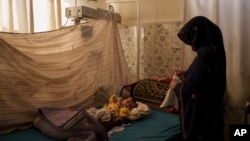The UN High Commissioner for Human Rights warns Afghanistan is facing a profound human right crisis and failure by the Taliban rulers to uphold the rights of their people will lead to further turmoil and hinder the country’s development. The High Commissioner’s report has been presented at a special session of the U.N. Human Rights Council.
This unrelentingly bleak report describes a society where millions of people are unable to meet their basic needs because of the near collapse of the Afghan economy. It says people suffering poverty and hunger are forced to take desperate measures to survive, including child labor, child marriage, and even the sale of children.
Before the Taliban takeover of Afghanistan in August, the United Nations recorded the highest number of civilian casualties on record, with women and children among the main victims. While casualty numbers have dropped, the report says civilians continue to be killed in attacks by various armed groups.
U.N. deputy high commissioner for human rights, Nada Al-Nashif, tells the Council extrajudicial killings are increasing across the country. She expresses concern at the continued recruitment of children by an extremist jihadist militant group and Taliban authorities.
"While the Taliban takeover has brought an uneasy end to fighting against governmental forces in the country, the current situation leaves the population with little protection in terms of human rights," Al Nashif said. "Women and girls in particular face great uncertainty with respect to the rights to education, to livelihoods and to participation, in which they had made important gains over the past
Al Nashif says Afghan society will pay a high price if the Taliban continue to marginalize women by depriving them of an education, prohibiting them from working, and keeping them under the control a male relative.
"The continued participation of women in all aspects of life will be fundamental to Afghanistan’s future," Al Nashif said. "The UN partners have estimated that restricting women from working could contribute an immediate loss of up to one billion dollars—or up to five percent of the country’s GDP. As more and more girls are held back and pushed further behind, that economic and social damage will accumulate for future generations.”
The U.N. Credentials Committee has decided to not allow the Taliban to represent Afghanistan at the United Nations. So, Nasir Andisha, Ambassador to the UN in Geneva under ex-President Afghan Ghani’s regime remains the person who the UN recognizes as the legitimate representative of Afghanistan.
In taking the floor at the council, the ambassador thanked the High Commissioner for her report. He called on the international community to side with the people of Afghanistan and to not allow the Taliban to deprive them of their fundamental rights and freedoms.





